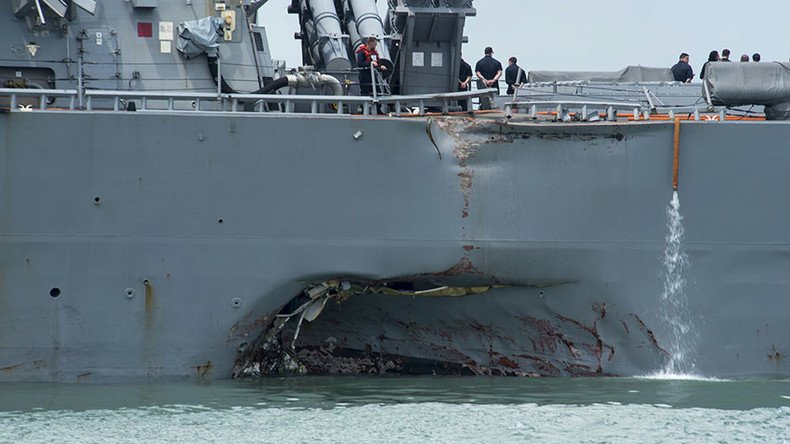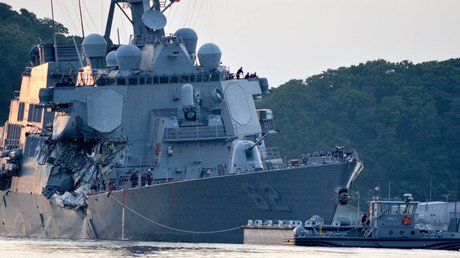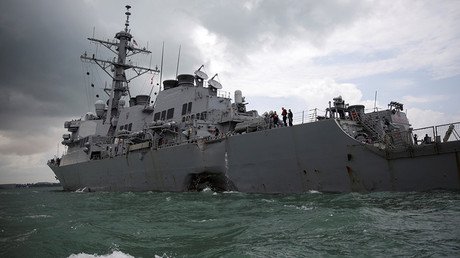US Navy sacks more commanders after deadly warship collisions

The US Navy has dismissed an admiral and a captain in connection with two deadly accidents where US warships collided with commercial vessels in the Pacific. This comes less than a month after the Navy fired the commander of the Seventh Fleet.
Rear Admiral Charles Williams, commander of Task Force 70, and Captain Jeffrey Bennett, commander of Destroyer Squadron 15, were fired by Seventh Fleet commander Vice Admiral Phil Sawyer, the Navy said Monday. “Both reliefs were due to a loss of confidence in their ability to command.”
The previous Seventh Fleet Commander, Joseph Aucoin, was dismissed on August 23, with Navy citing the same “loss of confidence” reasoning. Aucoin was scheduled to retire in September.
Collisions involving USS Fitzgerald and USS John S. McCain this summer in Asia Pacific killed a total of 17 US sailors. Even though investigations into both incidents are still ongoing, the Navy has already fired the Fitzgerald’s captain and other sailors after poor seamanship and flaws in keeping watch were found to have contributed to its collision.
“Clearly at some point, the bridge team lost situational awareness,” Admiral William F. Moran, the vice chief of naval operations, told reporters in August.
The Fitzgerald collided with a container ship off the coast of Japan in June, killing seven American sailors. Two months later, the McCain, another guided-missile destroyer, collided with a commercial oil tanker east of Singapore. Ten sailors were killed in the incident. The collision tore a gaping hole in the McCain’s left rear hull and flooded adjacent compartments, including crew berths, machinery and communication rooms.
“To put that in perspective, these heartbreaking casualties are more than the number of [American] service members that we have lost in the Afghanistan war zone in the 2017,” Representative Joe Courtney (D-Connecticut) said at a House Armed Services subcommittee hearing on September 8, as lawmakers demanded answers as to why US warships were involved in more accidents this year than in any year over the past two decades.
At the hearing, Admiral Moran acknowledged that the US Navy compromised its standards in order to meet high operational demands.
Navy commanders have approved numerous waivers to expiring certifications of standards, such as seamanship, Moran told the Seapower and Projection Forces Subcommittee of the House Armed Services Committee.
“We have allowed standards to drop as the number of certifications has grown,” Moran said, although he refused to specifically address the Fitzgerald and McCain incidents, citing ongoing investigations.
The Navy is “shocked” by the collisions, and is carrying out a comprehensive review to fix the disturbing trend, the vice chief of naval operations told lawmakers.
This year, there were two other accidents involving US warships in the Asia Pacific, but no injuries were reported.
Citing the incidents, the Navy briefly suspended operations of all US fleets in late August.
“While each of these four incidents is unique, they cannot be viewed in isolation,” Admiral Scott Swift said.
The latest dismissals in the Navy also come days before another scheduled Congressional hearing - this time at the Senate Armed Services Committee. Chief of Naval Operations Admiral John Richardson and Secretary of the Navy Richard V. Spencer are expected to testify alongside the director of Defense Capabilities and Management at the Government Accountability Office (GAO) John H. Pendleton, who also testified with Admiral Moran earlier this month on shortcomings in the training of Navy crews.
“The high operational tempo of ships homeported overseas had resulted in what Navy personnel called a ‘train on the margins’ approach, a shorthand way to say there was no dedicated training time set aside for the ships so crews trained while underway or in the limited time between underway periods,” Pendleton told lawmakers.














